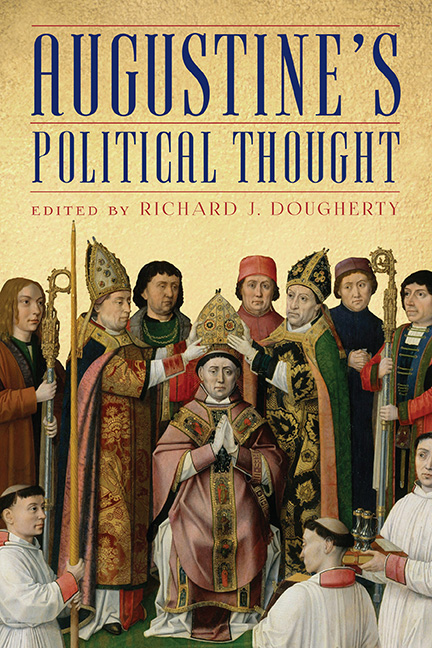Book contents
- Frontmatter
- Contents
- Acknowledgments
- Introduction
- Part 1 Politics, Nature, and Virtue
- Part 2 St. Augustine and Ancient Political Philosophy
- 6 The Few, the Many, and the Universal Way of Salvation: Augustine's Point of Engagement with Platonic Political Thought
- 7 Echoes and Adaptations in Augustine's Confessions of Plato's Teaching on Art and Politics in the Republic
- 8 Truth, Lies, Deception, Esotericism: The Case of St. Augustine
- 9 Augustine's Ciceronian Response to the Ciceronian Patriot
- 10 Augustine's City of God and Roman Sacral Politics
- 11 Augustine and Platonic Political Philosophy: The Contribution of Joseph Ratzinger
- Notes on Contributors
- Index
10 - Augustine's City of God and Roman Sacral Politics
from Part 2 - St. Augustine and Ancient Political Philosophy
Published online by Cambridge University Press: 26 June 2019
- Frontmatter
- Contents
- Acknowledgments
- Introduction
- Part 1 Politics, Nature, and Virtue
- Part 2 St. Augustine and Ancient Political Philosophy
- 6 The Few, the Many, and the Universal Way of Salvation: Augustine's Point of Engagement with Platonic Political Thought
- 7 Echoes and Adaptations in Augustine's Confessions of Plato's Teaching on Art and Politics in the Republic
- 8 Truth, Lies, Deception, Esotericism: The Case of St. Augustine
- 9 Augustine's Ciceronian Response to the Ciceronian Patriot
- 10 Augustine's City of God and Roman Sacral Politics
- 11 Augustine and Platonic Political Philosophy: The Contribution of Joseph Ratzinger
- Notes on Contributors
- Index
Summary
Books 1 through 10 of The City of God are an extended polemic against Roman civic religion and Neoplatonism. When it comes to contemporary scholarship on Augustine's political thought, these concerns tend to play only a peripheral and supporting role if they are mentioned at all. The argument of this essay is that books 1–10 are a critique of the various ways that Roman religion influenced Roman political thought and practice. Roman religion is the primary resource that informs Roman politics. Despite the recent tendency of discussions of political thought to be centered around themes and passages in book 19, books 1 through 10 give us a rather capacious window into Augustine's criticisms of Rome and his own political thought. This essay will seek to clarify Augustine's understanding of Roman religion and his critique of Roman sacral politics in The City of God. Roman religion is not something peripheral to Augustine's description and critique of Roman politics in City; rather, it lies at the very heart of Augustine's formulation of the two cities and his critique of Rome. When we see the connections between the Roman religion and Roman politics and society in the Roman mind more clearly, the criticisms developed in City will become more transparent and their relevance amplified.
Politics and religion are intertwined phenomena in the ancient world, so it is not surprising that Augustine treats the two together. I use the term “sacral politics” to name this combination of politics and religion as practiced in Rome. Augustine will name different forms of religion in Roman history, but he thinks that one way or the other they all serve the same purpose—to deceive the Romans into serving false gods who only seek to harm them. Roman religion and sacral politics are two distinct things, even as they are intimately bound together. Religion did not have purely political purposes, but the two were linked together across Roman public life in a variety of different ways, including rites and festivals that did not have overt political purposes.
Sacral politics as practiced in Rome was rooted in three assumptions. First, the Romans believed there were gods and that these gods were powerful. The religious world of the ancients was filled with demons, gods, and a host of other spiritual beings.
- Type
- Chapter
- Information
- Augustine's Political Thought , pp. 222 - 244Publisher: Boydell & BrewerPrint publication year: 2019



